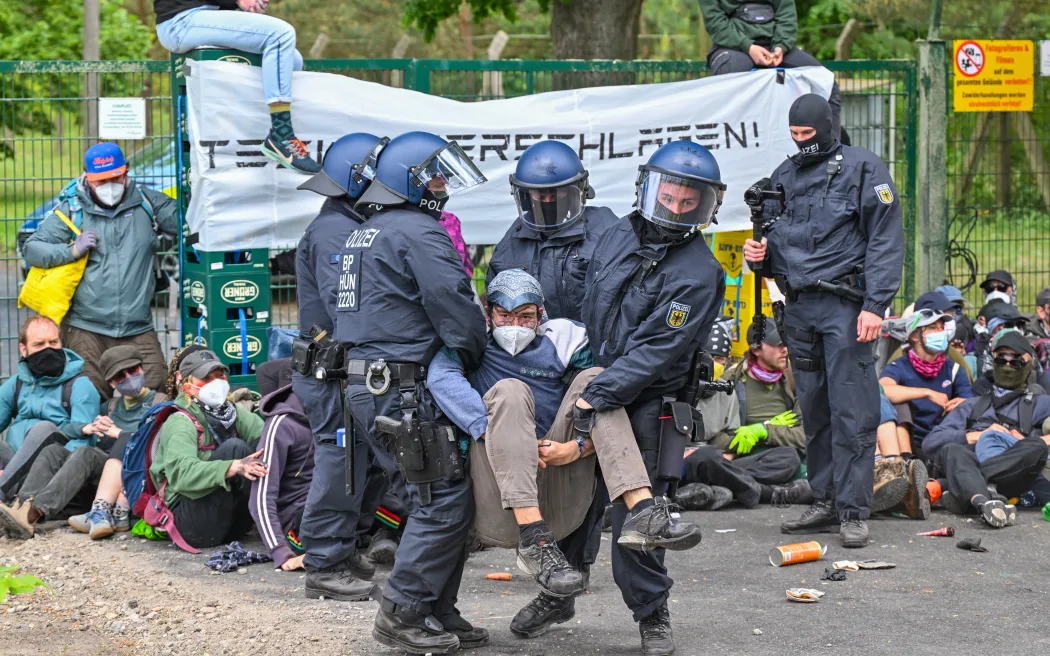On the 12th of May 2024, a sudden and unanticipated occurrence unfolded when a group of demonstrators attempted to breach Tesla’s factory in Grünheide, Germany. This event is indicative of the deepening tensions that surround the electric car manufacturer’s environmental and labor practices. The protest highlights the complexity of the ongoing debate concerning the impact of Tesla’s operations and the increasing public scrutiny of corporate behavior.
The demonstration, which commenced in a peaceful manner, witnessed approximately 50 protestors assembling at the factory entrance, brandishing banners and chanting slogans in opposition to Tesla’s operations. The protestors, comprising local residents, environmental activists, and labor union representatives, asserted that the factory was inflicting substantial harm on the local ecosystem, in addition to violating workers’ rights.
RIOT POLICE DEPLOYED: Tensions Boil Over at Tesla’s Grunheide Factory”
As the demonstration progressed, a group of protestors made an attempt to forcefully enter the factory premises, which required immediate police intervention. In response, police officers outfitted in full riot gear were dispatched to the site, and several protestors were taken into custody. The situation remained unstable for several hours, with law enforcement officials faced with the challenge of maintaining order.

The most recent altercation between Tesla, local communities, environmental groups, and labor unions is the latest in a series of confrontations. Since the commencement of its construction in 2020, the company’s factory in Grünheide has been the subject of controversy. The factory is expected to manufacture thousands of electric vehicles per year.
Environmental concerns have been a subject of intense debate in the context of the factory’s operations, with some critics voicing concerns that the operations may result in deforestation, water pollution, and heightened carbon emissions. In response, Tesla has refuted these allegations, asserting that it has instituted various measures aimed at mitigating its environmental footprint, including the deployment of renewable energy sources and the implementation of sustainable manufacturing practices.
However, some demonstrators contend that the measures taken are inadequate and that the company’s expansion plans will only worsen the issue. “Tesla’s manufacturing plant is a symbol of the destructive potential of capitalism,” asserted Anna Klein, a local resident and environmental activist. “We cannot remain inactive while our community is sacrificed for the sake of financial gain.”
The factory’s labor practices have been a contentious issue, with workers raising concerns about substandard working conditions, extended working hours, and insufficient compensation. Tesla has faced accusations of labor law violations and disregard for workers’ rights, allegations that the company has persistently refuted.
The recent incident that occurred at the manufacturing plant has triggered a broader discussion regarding the role of corporations in society and their obligation towards the environment and local communities. With the world transitioning towards electric mobility, companies such as Tesla are facing mounting pressure to demonstrate their commitment to sustainability and social responsibility.
In a statement, Tesla said: “We respect the right to peaceful protest, but we will not tolerate any form of violence or intimidation. We are committed to working with local authorities and stakeholders to address any concerns and ensure our operations are sustainable and responsible.”
The incident is under investigation, and no further details have been released. The factory remains operational, and production continues uninterrupted. However, the tensions between Tesla and local communities, environmental groups, and labor unions are likely to continue, as the company faces growing scrutiny over its operations.
As the world watches the developments at Tesla’s German factory, one thing is clear: the future of sustainable and responsible business practices is at stake. Companies like Tesla must navigate the challenges of growth and profitability while also demonstrating a commitment to the environment and local communities. The consequences of failure will be severe, not just for the company, but for the planet and future generations.


